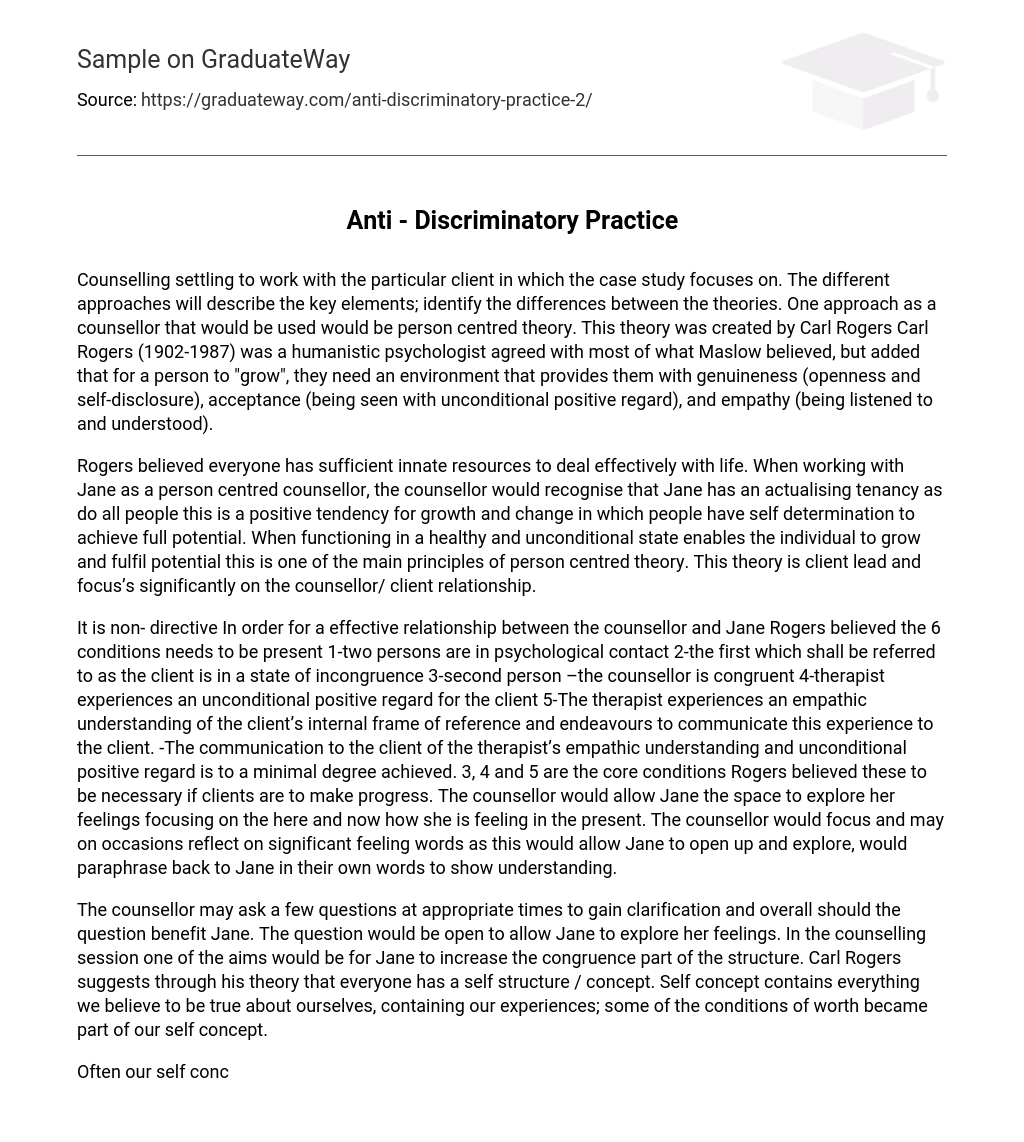Counselling settling to work with the particular client in which the case study focuses on. The different approaches will describe the key elements; identify the differences between the theories. One approach as a counsellor that would be used would be person centred theory. This theory was created by Carl Rogers Carl Rogers (1902-1987) was a humanistic psychologist agreed with most of what Maslow believed, but added that for a person to “grow”, they need an environment that provides them with genuineness (openness and self-disclosure), acceptance (being seen with unconditional positive regard), and empathy (being listened to and understood).
Rogers believed everyone has sufficient innate resources to deal effectively with life. When working with Jane as a person centred counsellor, the counsellor would recognise that Jane has an actualising tenancy as do all people this is a positive tendency for growth and change in which people have self determination to achieve full potential. When functioning in a healthy and unconditional state enables the individual to grow and fulfil potential this is one of the main principles of person centred theory. This theory is client lead and focus’s significantly on the counsellor/ client relationship.
It is non- directive In order for a effective relationship between the counsellor and Jane Rogers believed the 6 conditions needs to be present 1-two persons are in psychological contact 2-the first which shall be referred to as the client is in a state of incongruence 3-second person –the counsellor is congruent 4-therapist experiences an unconditional positive regard for the client 5-The therapist experiences an empathic understanding of the client’s internal frame of reference and endeavours to communicate this experience to the client. -The communication to the client of the therapist’s empathic understanding and unconditional positive regard is to a minimal degree achieved. 3, 4 and 5 are the core conditions Rogers believed these to be necessary if clients are to make progress. The counsellor would allow Jane the space to explore her feelings focusing on the here and now how she is feeling in the present. The counsellor would focus and may on occasions reflect on significant feeling words as this would allow Jane to open up and explore, would paraphrase back to Jane in their own words to show understanding.
The counsellor may ask a few questions at appropriate times to gain clarification and overall should the question benefit Jane. The question would be open to allow Jane to explore her feelings. In the counselling session one of the aims would be for Jane to increase the congruence part of the structure. Carl Rogers suggests through his theory that everyone has a self structure / concept. Self concept contains everything we believe to be true about ourselves, containing our experiences; some of the conditions of worth became part of our self concept.
Often our self concept feelings may not be true to our organismic self. The conditions of worth according to Carl Rogers’s states that through the experiences people are only acceptable if they were to think, feel and behave in a way that is positivity valued by others. Jane’s conditions of worth can have an impact on the way she feels about herself as she states she feels she is letting people down by not doing her fair share. She states that her father was absence from the home a lot when she was younger and did not have a relationship with him.
The counsellor is non – directive and this is client lead therefore the client leads the way in which the session goes what is spoken of. Referring to the case study of Jane the counsellor may reflect words back for Jane to expand on the meaning to have the oppunitunity to explore her feelings for example: Jane mentioned “she’s lost her spark” they have an “ok” relationship mother was very “Victorian” she stays in watching “mindless” television she says she should “pull herself together” those words could have different meanings the counsellor may need clarification.
Jane described her father seem to be absent from the home and did not seem to bother with Jane, she moves on to talk about how her husband died 5 years ago she felt they had drifted apart over the past 10 years the counsellor may link this to the theory of Phenomenology is not the events that have caused Jane to behave and feel in this way instead it is the way she has interpreted these events which determines the responses. In the context it underpins the need to discover Jane’s perception.





